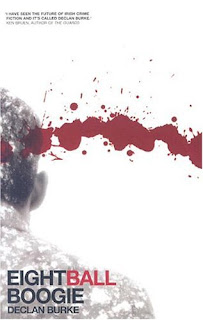I'll start by saying that The Dark Fields is quite a different kettle of fish from Winterland. Being set in New York, with no reference to Ireland, and with a main character with the name of Eddie Spinola, Glynn has very successfully masked his Irish-born identity. It is truly an American novel, and a New York City novel to boot. The title takes its reference from The Great Gatsby, and though F. Scott Fitzgerald obviously had some Irish blood in his veins, the story is essentially about American success and American failure.
But lest I get too serious about this before we even start, The Dark Fields is first and foremost a thriller. Eddie Spinola is a former coke addict and pretty much failure at everything he turns his hand to, including marriage. But that doesn't stop him from running headlong into his former brother-in-law, Vernon Gant, while he's out walking the streets near his apartment, trying to come up with some inspiration for some copy he's supposed to be writing. As the result of their conversation, Vernon offers him a 'free sample' of a new drug he's helping market. Eddie thought he was done with the drug life, and has the token reservations about popping a pill he knows nothing about. But come on--if he was totally sensible, there wouldn't be a story, would there?
What Eddie soon learns is that the drug is an amazing performance enhancer. It is a little hard to pin down what the drug actually does, but basically it all but forces Eddie to clean up his act, organize his life and his thoughts. It's the kind of drug that many of us would be tempted by, I suspect, especially those doing freelance work under deadline. When Eddie learns what the thing does, he has to have more. So he goes back to Vernon's apartment, and...well, that's where the adventure really begins.
I'll leave the various twists and turns of the plot for you to untangle, but I thought I'd comment on a few of the points Glynn makes in the course of the narrative. Not surprisingly, Eddie does rather well on the stock market, and this is one of the things he thinks about his success:
"Grappling for understanding, I soon realized that despite its susceptibility to predictable metaphor--it was an ocean, a celestial firmament, a numerical representation of the will of God--the stock market nevertheless was something more than just a market for stocks. In its complexity and ceaseless motion the twenty-four-hour global network of trading systems was nothing less than a template for human consciousness, with the electronic marketplace perhaps forming humanity's first tentative version of a collective nervous system, a global brain...It seemed to me that in that moment that I had tumbled upon it--I was jacked in and booted up...my mind was a living fractal, a mirrored part of the greater functioning whole."
(For another and earlier novel about the markets, check out David Paynes' very fine Confessions of a Taoist on Wall Street.)
What's significant to me is that this whole train of thought, while interesting in its own way, would probably not be framed the same way now, even a mere decade later. It's funny that as I was sitting in a deli reading this book there were two guys sitting next to me, and they too were talking about making money, but it was now all about portals and social networking and your platform and free content versus paid content, etc. It did make me feel that this book, published in England in 2001, was in some ways an elegy for a vanished time in New York City. There's no mention of the Twin Towers, or terrorists, and Wall Street hasn't become quite the enemy of Main Street that it's perceived to be now. Email of course exists but the whole networking way of life hasn't become significant enough yet to be the basis of Glynn's metaphor for the global mind, as it would almost certainly be today.
Our hero, while not ill-intentioned is somewhat remote, ala American Psycho. Some of this is due to the state the performance drug induces in him, but some of it seems always to have been with him. We are interested in what happens to him, but don't necessarily feel for him as we do with Glynn's subsequent protagonist, Gina Rafferty. Eddie is in some ways incurious, despite his newfound ability to take on vast amounts of information. He also seems to have few thoughts about what to do with his new powers--a humanitarian he is not.
One thing that I found interesting was that buildings played such a prominent role in this book, because a building proves to be almost another character in Winterland. Although it might seem on the surface that the book is about gaining mastery and wealth, a lot of it is simply about the aspiration to move from cramped digs in an unfashionable part of town to a grandiose suite in a building called The Celestial. We see the city from the heights more than once in this book.
For the heck of it, I'll just link here to a post by PQ over at the always thought provoking A Building Roam, called Dream Architecture. It seems related.
The pacing in The Dark Fields suffers a bit in comparison to Winterland, though it's still an enjoyable read. I am quite interested in what the filmmakers did with the story, as they have inevitably tightened it up, and I assume made it more relevant to life in 2011. The tale itself is timeless, of course. Since Gatsby, Americans hustlers and dreamers never do end well.
At least not in fiction.










